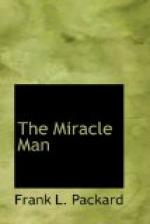No one answered her. She had begged Madison to go over it all again—and she had summed it up herself. There was—the Patriarch.
There was utter silence in the room now, save only for that low, solemn boom of distant surf—for Madison had stopped his nervous pacing up and down, and stood now by the Patriarch’s armchair gazing into the fireplace.
The minutes passed, and the silence in that dim, shadowed room grew tense—and tenser still—until the very shadows themselves, as the lamp flickered now and then, seemed to creep and shift and readjust themselves in stealth. No sound—no movement—utter stillness—only, from without, the mourning of the surf, like a dirge now.
And then, with a sudden sob, Helena flung out her arms across the table toward the Patriarch.
“Oh, if he could only speak!” she cried pitifully. “If he could only speak—he would show us the way out.”
The words seemed to come to Madison as an added pang. He turned his eyes instinctively from the fireplace to the Patriarch beside him—and then, a moment, as a man stricken, he stood there—and then reaching quickly for the lamp from the table he held it up, and leaned forward toward the figure in the chair.
Helena, startled at the act, rose almost unconsciously to her feet, her hands holding tightly to the table edge—looking at Madison, looking at the silent form where Pale Face Harry, where the Flopper looked.
“What is it?” she asked tensely, under her breath.
Madison’s lips moved—silently. His face was white, ashen—there was no color in it. Then his lips moved once more.
“The way out,” he said; and again, in a low, awed way: “The way out. We can make restitution now—we can give it all back—he has shown us the way out.”
Helena’s lips were quivering, tears were dimming the brown eyes, trembling on the lashes, as she stepped now to Madison’s side.
“It is God who has shown us the way out,” she whispered brokenly—and dropping down before the chair, her little form shaken with sobs, she hid her face on the Patriarch’s knees.
And serene and peaceful as a child in sleep, a smile like a benediction on the saintly face, the Patriarch sat in his armchair by the fireplace where he had been wont to sit in years gone by—and so he had passed on.
The Patriarch was dead.
—XXIV—
VALE!
The years have passed—but in their passing have brought few changes to the little village nestling in the Maine pines that border on the sea. Not many changes—it is as though Time had touched it loath to touch at all; as though some spirit lingering there, sweet and fresh and vernal, had bade Time stay its hand.




